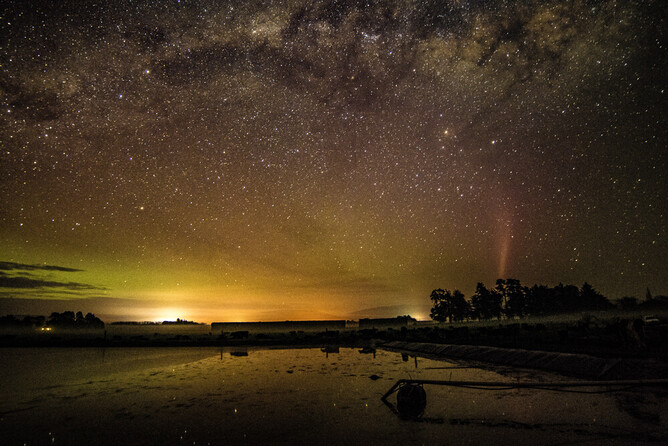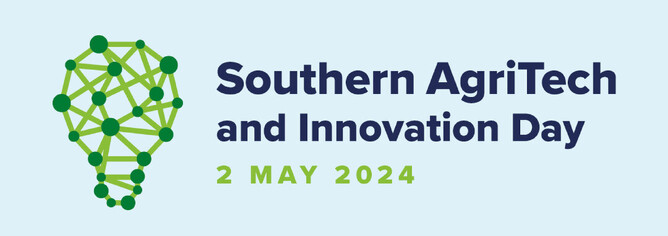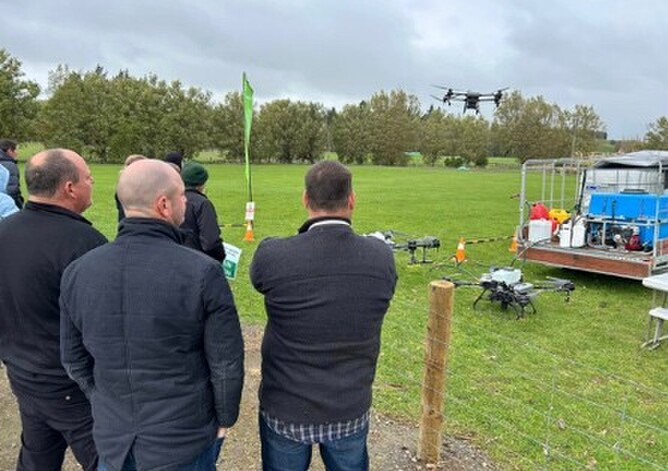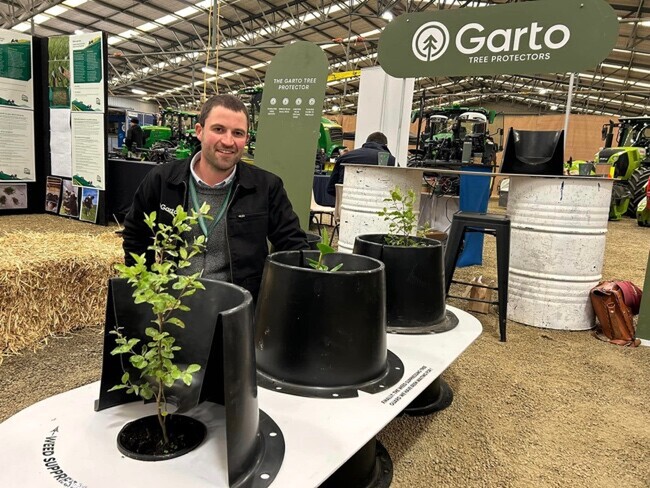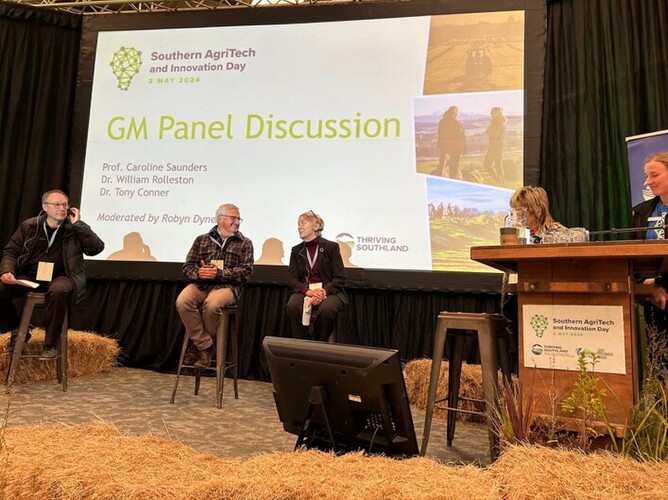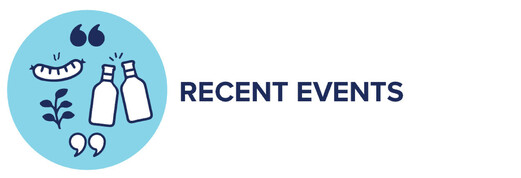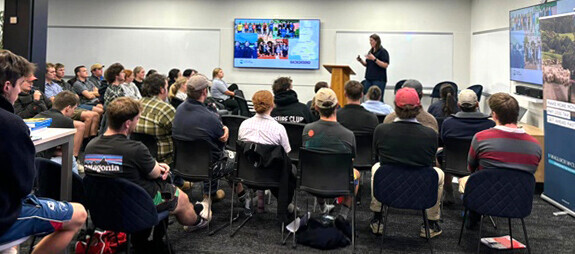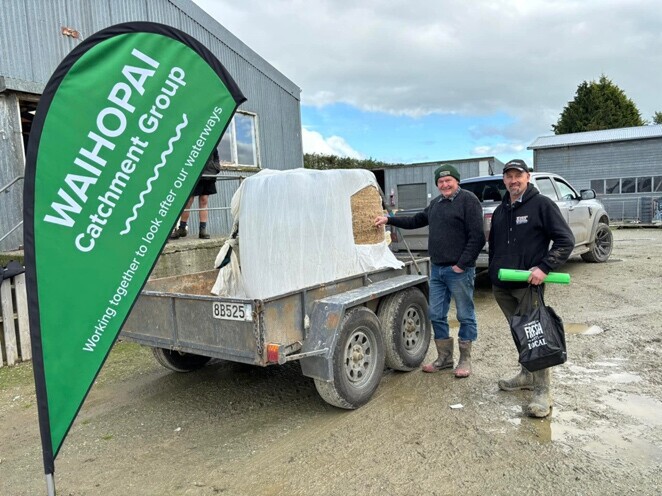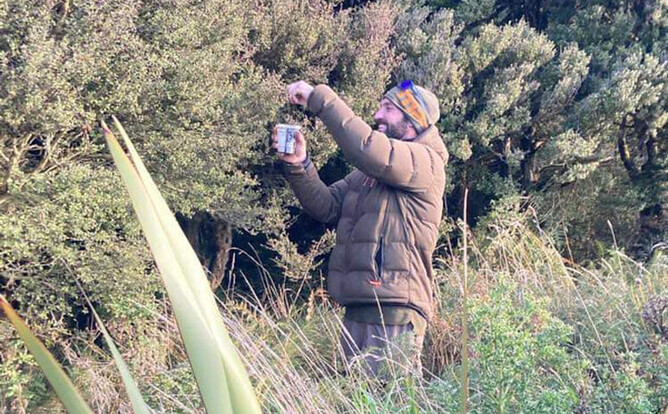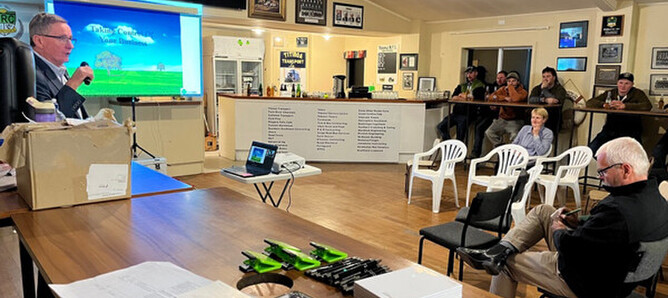As the days draw in, there’s plenty to do on farm and we wonder what sort of winter we’re going to get - hopefully plenty of sunshine to keep a smile on our faces.
It’s been a busy month for Catchment Groups during May with everything from seed gathering days to resilience workshops to hosting students from Lincoln and looking at fantastic, innovative farm practice around the region. More on all that below.
Arguably the highlight of last month was the Southland AgriTech and Innovation Day with more than 300 people attending!
The audience heard about how to get the most out of data, listened to an amazing panel discussion on genetic modification, learned about biological advances, precision soil mapping, robotics, trade and tech happenings, energy smart farming, and checked out some incredible farm innovations that are available.
We thought it would be useful to summarise some key takeaways from the day:
The best way to predict the future is to be part of it
We need to be thinking 10-20 years ahead
If we can better understand what’s under the hood (our soils), farm managers can use this to improve operations
Take your farm team along on the tech journey
Drones have so many applications, from weed spraying to using thermal cameras to check stock health
We are agile operators who lead the world and we can’t stand still
Embrace new technology as a way of opening up diversified farming options
Be curious and give it a crack
Read more about the day in the news section below!
Resource of the Month - Winter Grazing Plans made easy!
Check out our awesome winter grazing resources - download a Winter Grazing Plan for your farm, listen to podcasts and access helpful sites for more information.
Click here for the info.
Southland AgriTech and Innovation Day hailed a huge success
More than 300 people attended the Southland AgriTech and Innovation Day on 2 May, and with a huge range of inspirational speakers and workshops, everyone went away buzzing.
Thriving Southland, with support from the Gore/Waimumu Catchment Group, hosted the event at the Southern Field Days site in Waimumu.
Thriving Southland catchment co-ordinator Tania Clarke said there was a big focus on workshops where people could get down to the “nitty gritty” of cost benefit, which was especially relevant in these tight economic times.
“This is a real shining light, because it’s showing where the
opportunities are for farm businesses.”
The event was dedicated to showcasing the latest advancements in farming technology and innovation, tailored specifically for the southern farming community, she said.
The line-up of speakers included AgriTech New Zealand chief executive Brendan O'Connell, who said New Zealand farmers were already world leaders but had the potential to take a lot more homegrown innovation to the world.
“They are the All Blacks of farming globally,” he said.
Data production and measurement was crucial, but O’Connell asked “what does it mean to be able to manage what you measure?”.
The answer was to use that data wisely to allow technology to find its place within growing systems, he said.
A panel discussion on genetic modification (GM) featured Professor Caroline Saunders, a well-known researcher focusing on sustainable wellbeing, farmer and biotech pioneer Dr William Rolleston, and renowned biotechnologist and geneticist Dr Tony Connor.
The trio called for a more informed national conversation around GM and gene editing, as the technologies held significant potential for sectors such as agriculture, including around combatting climate change. New Zealand farmers who embraced GM/gene editing could co-exist alongside those wishing to remain GE-free, they said.
A series of ‘Innovation Stations’ showcased some New Zealand examples of cutting edge sustainable practices and emerging technologies such as spray drones and robotic animals.
Canterbury farmer Duncan Humm summed it up well saying: “Knowledge is probably the most powerful tool we’ve got”.
Thanks heaps to everyone involved and a special shoutout to our amazing sponsors!
Mataura Catchment Group Grants
Are you in the Mataura Catchment and looking for funding to protect and enhance Southland’s environment?
A grant of up to $5,000 per Catchment Group, has been initiated by the Mataura Catchment Liaison Committee in conjunction with Environment Southland.
If your Catchment Group has projects that benefit your catchment and wider environment by addressing water quality, climate resilience, biodiversity and/or soil conservation, you may be eligible for a grant.
Applications close on the 30 June. For more information contact service@es.govt.nz (with ‘Mataura Catchment Group Grants’ in the subject line) or contact Becky Crack (Land Sustainability Officer at Environment Southland) on 0800 76 88 45.
Bale Wrap Recycling tips from Between the Domes Catchment Group
With winter here, the Between the Domes Catchment Group want to remind you to do the right thing with your baleage wrap and silage pit covers by getting them recycled through one of the options available.
Set up good systems at the start of the winter season and train your team about what is required to ensure your bale wrap is in good condition for recycling and to avoid unsightly plastic blowing around the countryside.
Some key points for recycling in Southland:
Please separate the outer and inner linings, and ensure all bale wrap is free of debris and netting.
Silage covers need to be cut into 3m wide strips and separate the oxygen layer from the outer layer.
Colour sorted where possible.
No contamination, such as net wrap, stones, metal, tape, or excessive dirt or organic material.
For more information about your recycling options follow the links below
https://recyclesouth.org.nz/balewrap.html
https://plasback.co.nz/recycling/
Potential new nursery seed project in Southland
There is an opportunity to explore a potential new project with Travis from Nursery Man https://www.nurseryman.co.nz, a commercial nursery located at 313 Seaward Downs Road.
Travis and his team have proposed a fantastic idea: establishing the Seeds of Knowledge Initiative and they want to collaborate with Catchment Groups.
CG members can turn up at the Nursey once a month to learn everything from seed collection and potting up, to planting the plant in the ground. Seeds from your own farm can be collected and used at these sessions as well!
Nursery Man would generously cover all capital expenses, including pots, potting mix, tools, etc. Additionally, mature plants will be donated for community projects or for purchase at a reduced price of ~$2 - $2.50 per plant (TBC).
If you are interested in this project, please email Tessa@Thrivingsouthland.co.nz and answer the following questions:
When would you like this to start? June, September
Which Catchment Group do you belong to?
Is there anything specific you would like to learn about?
Lincoln University students visit the south
Pies, a panel of ex-grads and over 100 Lincoln University students - it wasn’t our usual day at the office, but how good!
Last month we mixed up the usual visit to Southland for the Lincoln students and bought them into the Invercargill CBD to chat with some ex-grads that now call Southland home and work here. Including our very own Tessa, who shared her story and a bit about the Catchment Groups.
We were stoked to share with the soon to be graduates what opportunities are waiting here for them in our great Southern region and what great work and projects are happening here with the Southland Catchment Group network.
Waihopai’s Wonderful Woolshed Mini Speaker Series
Running an interesting, fun and relaxed lunchtime event with four short and sweet speakers was a new idea for us, and it worked really well.
Woodlands Research Farm Team hosted us at their amazing woolshed, and we had six great speakers. Orepuki Farmer & Inventor Grant Lightfoot chatted about his edible Kiwi Econet, Ainsley Adams from AB Lime talked on all things agri-waste and landfill, Anastazia Raymond & Rob Bird from Environment Southland shared exciting new opportunities and happenings for the Waihopai Catchment, and Bob Schmidt and Eoin Mackenzie reflected on what could be next for Waihopai Catchment Group.
A huge thank you to our speakers, the Woodlands Research Farm team for the use of their woolshed, and the amazing Rabobank Team who cooked up a very tasty BBQ lunch. We would definitely do this style of event again. It was great to see how far we have come and what great opportunities we have.
Figuring out the next steps for Makarewa Headwaters Revival Project
Animal pests and their impact on our local bush and farms has always been a huge concern for the Makarewa Headwaters Catchment Group.
Last year, they were funded by Thriving Southland to carry out Phase 1 of the Makarewa Headwaters Revival Project to help understand the extent of the feral animal problem in the Hokonui Hills (including deer, pigs, goat and Hokonui merino – ungulate pests, i.e., those with cloven hooves).
Since Phase 1 was wrapped up in November, they have been engaging with people around the country for advice and information and thinking about the options for what’s next!
The Group recently held a facilitated strategy session to help clarify the pathways forward and priorities for Phase 2 of the project. It was a great session with lots of knowledge, skills and ideas shared. Many thanks to Mo Topham for doing an amazing job of facilitating the session, and to Mo and Simon for their very kind donation of deer netting for proposed exclusion zones (to help monitor the impact of our work on local bush).
There will be a joint working bee with Hedgehope Makarewa Catchment Group on the Topham’s farm later in the year to get some more netting.
The Group’s focus in Phase 2 of the Project is on reducing the number of feral animals and monitoring environmental improvement. They have started working on deer and pig culling operations in the catchment, but the focus is very much on taking some time to figure out exactly what they need to do longer-term to reduce feral animal numbers and improve the environmental impacts.
Mid Oreti Native Seed Collecting and Pest Control Workshop
The rain stopped and the sun came out for our annual seed collecting event at Motu Ngahere. Three generation of Nelsons joined the AB Lime crew at the AB Lime native bush block. Brad (AB Lime’s Biodiversity Manager) pointed out species of plants on the loop track, and we collected fruit/seed from rohutu, grisilinia (broadleaf), red matipo, manuka, pittosporums and horipito.
Then we nipped back to the nursery and learnt how to process the fruit to get to the seeds. These seeds are the new round of native seedlings to be propagated for the Mid Ōreti Mini Forest Movement, growing native plants for landowners, schools, and community groups across Central Southland.
We had a lovely surprise this week when Sarah from Harpley Farms sent us some photos of the sediment trap they created and planted out using plants from our Mini Forest Movement. We absolutely love to see the finished product - it puts a big smile on our faces!
This is a great time of year to collect native seeds from shrubs and trees. Our top tip is all about manuka - you can collect the nuts now and put them in front of the fire in a container like you would your wet boots and they will dry out and crack open revealing the seeds. The seed is like hairs and there are hundreds in each little nut.
The Good the Bad and the Ugly arrives in Tokanui
We had a great turnout in Tokanui in mid-May for ' The Good, The Bad, and The Ugly', organised by the South Coast Catchment Group. This included a thought provoking and informative presentation from Peter Flannery (Farm Plan Ltd) with some great tips on how get through these challenging times:
Control the things in your circle of influence
Know your why? Other than making money what is the purpose of your business?
Be proactive in your decisions
Keep communicating with the key people in your business - what's your plan?
Look after the most important asset to your businesses - yourself.
The event was kindly supported by ASB Bank, who also shared some insights from a banking perspective, and Southland Rural Support Trust and OCC Health South who carried out health checks on the night.
Thank you to the amazing businesses and organisations who made this event possible. Tokanui Rugby Club, Farm Plan Ltd, ASB Bank, Southland Rural Support Trust and OCC Health South.
Mini Forest Movement Native Plant Nursery drop-in session (first Tuesday of every month)
4 June, 4pm to 6pm
AB Lime Nursery, 10 Bend Road, Winton
All welcome to our monthly native plant growing working-bee evenings at the AB Lime Nursery. Your help will go towards growing plants for the Mid Oreti Mini Forest Movement Project, which provides native plants to the local community and landowners for their planting projects. Training is provided and all ages welcome! Stay for as little or as long as you like.
Between the Domes Wetlands Afternoon
11 June, 1pm to 3pm
304 Acton Downs Road, Mossburn
Join the Between the Domes Catchment Group for an afternoon visit to Dot Stevens amazing wetlands – hear about her journey to create the wetland on their farm. Check out the Thriving Southland website for further details.
Mens Health Matters: On the Couch breakfast
12 June, 7.30am to 9am
The Southland Chamber of Commerce is holding a ‘Men’s Health Matter’s’ breakfast featuring Paddy O’Brien, NZ international rugby referee and David Ready, Gloriavale survivor. It’s $55 for members and $69 for non-members.
Hedgehope-Makarewa Native Planting and Establishment Workshop
18 June, 12.30pm to 4.30pm
Mabel Bush Hall, 471 Rakahouka-Hedgehope Road, Mabel Bush
All welcome to attend a workshop hosted by the Hedgehope-Makarewa Catchment Group, to learn how to achieve native planting success on your land. Supported by MPI and Environment Southland, the workshop will include local speakers and those experienced with native establishment to hear about species selection, planting method and caring for your plants.
Lunch is provided so a RSVP would be appreciated to
susan.moore-lavo@mpi.govt.nz
Food, Farming and Freshwater Roadshow
20 June, 12pm to 5pm
Otautau Connect Centre
ACE and Our Land and Water National Science Challenge bring to you a range of speakers to present practical science research for farmers.
You are invited to join this informative day looking at the role of rural communities in the sustainable future of our primary sector and explore local scenarios with practical applications you can use in your everyday work. This event offers an opportunity to delve into independent research discoveries and engage in thought-provoking discussions. Leading independent researchers will each give a brief outlook of opportunities, some threats, and current (and future) signals in our markets.
Register for the event now here
Keep an eye out for more updates and details on speakers on the Thriving Southland website.
Lower Oreti Draft projects output
4 June, 7pm to 8.30pm
Waianiwa Hall Social Club Room- 268 Argyle – Otahuti Road, Waianiwa
Lower Oreti Catchment Group members are welcome to join the Land & Water Science team presenting the draft project outputs for the local wet area/ wetlands project maps. Cash bar will be open.
Between the Domes Winter Wellbeing Event
25 June, 7pm
Lumsden Hall
Between the Domes local man, Jack Cocks, joins the Group to talk about resilience. Hear about Jack’s major health scare and how he then used this experience to guide his Kellogg Rural Leadership Study asking ‘how resilient farmers thrive in the face of adversity?’ Everyone welcome. Check out the website for further details.
There are likely to be more events in the pipeline so make sure you check out the events section on the Thriving Southland website and the Facebook page for details.
Have a great June,
Ngā mihi
Richard Kyte (Thriving Southland Project Lead) and the Thriving Southland Team
